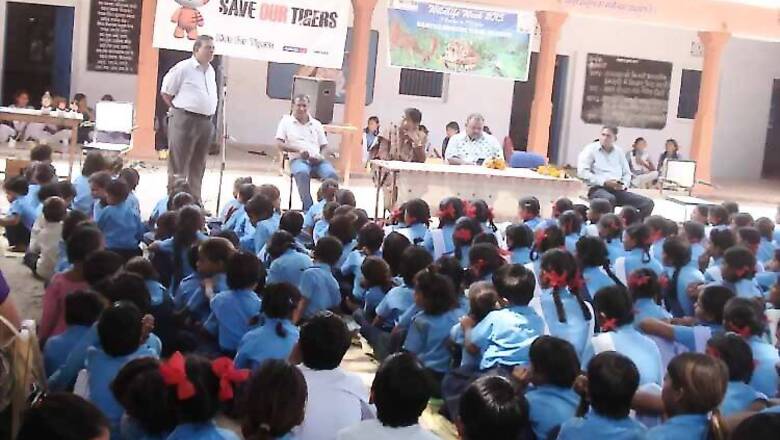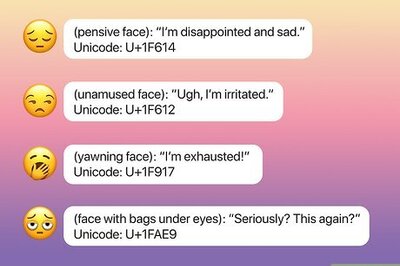
views
The fact that India’s tiger population was dwindling was an open secret. However, nothing could prepare the nation for the shock that it experienced when the government announced in 2008 that the number had fallen to mere 1,411 tigers. There was an outcry from the public, civil society groups and NGOs but more than that people realized that something needs to be done for the critically endangered national animal of India.
The Government of India came up with a plan of setting up 5 new tiger reserves as an emergency response. This measure was believed to take about 5 years to implement. And though the situation was dire, the Project Tiger secretary, Rajesh Gopal, said in a statement, “The (government) assessment shows that though the tiger has suffered due to poaching, loss of quality habitat, and loss of its prey, there is still hope," At the time, such a statement seemed optimistic and the task was cut out for conservationists.
Aircel, a leading telecom operator in the country, knowing that this regal animal, ingrained in our heritage and an important part of the ecosystem had to be rescued, decided to put its considerable efforts behind the alarming situation of the depleting tiger numbers in the country. Aircel decided to take a step that went beyond the ambit of simple corporate social responsibility and invested itself very meaningfully in the issue.
The company adopted a two pronged approach. The first was to raise awareness with the ‘Just 1,411 left’ campaign. The campaign, “Just 1,411 left, ‘Save our Tigers’ struck a chord and had millions of people rallying to the cause and lending their voices to it.
The second approach was to partner with several well-known organizations like World Wildlife Fund-India, Wildlife Conservation Trust, Wildlife Trust of India, Sanctuary Asia and an English language news daily, as well as several noted conservationists to create unparalleled impact on-the-ground. These projects work along three themes. They are capacity building, awareness building and conflict mitigation.
The reason for creating and mobilizing such an expansive network was to bring a holistic approach to tackle the crisis of the depleting tiger populations. The issue had reached a point where simple measures would not suffice and only an all-round effort incorporating lots of expertise would be off any use. Over time, Aircel was involved in a number of successful programs with these organizations.
WWF India was the first partner in Aircel’s initiative and work with them began in 2008 itself. With the Support Initiative Fund they worked in all the tiger reserves in the country, extending infrastructure and capacity support as necessary. The conservation of tigers of Assam was a particularly challenging issue that was taken on. Assam, despite its healthy population of tigers, also has some of the highest incidences of Human-Animal conflict and poaching.

Together, they trained forest officials in anti-poaching measures and helped secure corridors and habitats. In the Sunderbans area in Bengal, solar lamps were put in villages to mitigate human-animal conflict that was a common problem in the area. Tigers avoid well-lit areas at night and the solar lamps proved to be a sustainable and novel solution to the problem.

In 2010, Aircel partnered with Sanctuary Asia with the intent of reaching out to the next generation and making them imbibe environmentalist values. Aircel opted to strengthen Sanctuary Asia’s decade old ‘Kids for Tigers’ program. Conducted in schools in about 15 cities, the program delineates the value of the tiger, using it as a symbol for nature and the health of the ecosystem. The program has reached about 20 lakh children so far. In the program ‘Kids for Tigers Express’, an edutainment van goes around villages of Ranthambore National Park teaching children about the importance of the tiger. Pioneering with such environmental education, Aircel and Sanctuary Asia have made a whole generation of children feel strongly for tiger conservation. It is hoped that these values will be permeated through communities and generations over time.
Aircel also has a fruitful partnership with Wildlife Trust of India since 2013. With the support of WTI , Aircel has been able to alleviate the human-animal conflict issues plaguing the Dudhwa Landscape. Rapid Response teams and Primary Response teams have been created to work with the communities in the region and help mitigate conflicts.

With its committed partnership with the Wildlife Trust of India, Aircel has been able to channel some of its efforts to South India as well. South India is home to one of India’s three biodiversity hotspots and plays host to a large number of tigers. With recent efforts ‘Snare-free forests’ have been made possible in Meghamalai Wildlife Sanctuary. Aircel also equipped forest staff with anti-poaching kits in Sathyamangalam Wildlife Sanctuary and provided for the re-fabrication of Rapid Response Unity in Cauvery Wildlife Sanctuary.

While all this was happening on the ground, Aircel held “Save our Tigers” telethons on TV, raising not just awareness in the public, but funding as well. Rs 10 crore were donated by the public for the cause of saving the tiger. Aircel then partnered with the NGO - Wildlife Conservation Trust to implement high impact on ground projects with funds raised. The projects consisted of developing and deploying Rapid Response Unit vehicles, revamping anti-poaching camps and training of frontline forest guards.

Aircel and the Wildlife Conservation Trust have been able to effectively place 41 Rapid Response Units in 35 tiger reserves, train frontline forest guards in various aspects of conservation and revamp over 1167 anti-poaching camps across most tiger reserves.
Aircel’s efforts when it comes to “Save our Tigers” have been varied, sustained and successful. When the numbers in 2008 were revealed – that there were only 1,411 tigers left – it was a time of national crisis. Aircel recognized this and played a role in helping the tiger fightback. The numbers stand at 2,226 today and Aircel, with great pride, continues with its efforts to 'Save Our Tigers'.





















Comments
0 comment